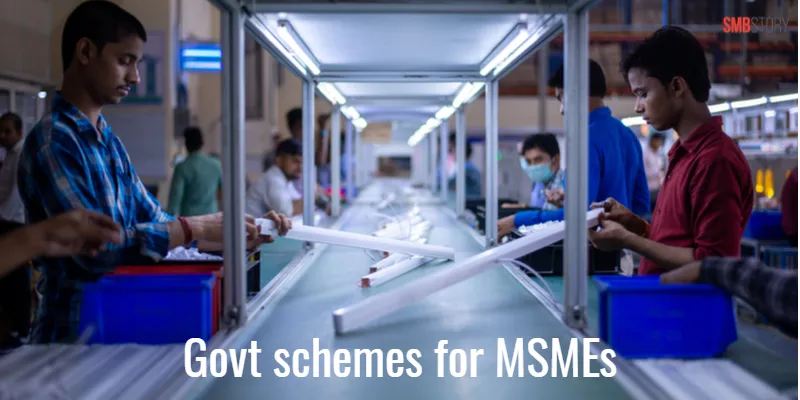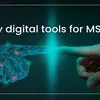Government schemes to help MSMEs tide over COVID-19 woes
India’s 63 million MSMEs contribute to 30 percent of the GDP and employ more than 100 million workers. These numbers underline the importance of MSME for the economy and the government, especially during the COVID-19 pandemic.
The current concerns of MSMEs in India and across the globe emerge from the volatile and sluggish market conditions the global and individual economies are going through.
These woes mainly are — cash flow crunch, demand downturn, and dip in profitability — which will adversely affect the sustainability and growth of micro, small, and medium enterprises (MSMEs).
The Indian government has announced many schemes and packages during the last one-and-a-half years to help MSMEs tide over COVID-19 struggles, besides the existing schemes.
Here are some of the major schemes and initiatives that are helping Indian small business owners.

(Image: Shutterstock)
Emergency Credit Line Guarantee Scheme (ECLGS)
This pandemic-specific scheme provides additional credit of up to Rs 3 lakh crore at a low-interest cost to MSMEs, thereby enabling MSMEs to meet their working capital needs and resume their businesses.
SMB owners can avail of the Guaranteed Emergency Credit Line (GECL), where a 100 percent guarantee is provided under the ECLGS scheme.
This loan will be extended in the form of an additional working capital term loan facility by Scheduled Commercial Banks (SCBs), Financial Institutions (FIs), and as an additional term loan facility by Non-Banking Financial Companies (NBFCs) to eligible borrowers.
However, not everyone can get access to the emergency credit line. It is restricted only to MSMEs that have existing debt or loans on their balance sheet.
No global tenders for procurement up to Rs 200 crore
MSMEs face competition from foreign companies when the global tender is floated for government procurement. Therefore, it decided to disallow global tenders for procurement of up to Rs 200 crore to help the homegrown companies.
This will create more opportunities for domestic MSMEs as it will provide them with a level playing ground.
Fund of Funds for equity infusion for MSMEs
The Fund of Funds provides equity funding to address the needs of high-growth MSMEs who have growth potential and viability. The government has earmarked Rs 50,000 crore for this scheme and encourages MSMEs to grow and get listed on stock exchanges.
Reclassification of MSMEs
Last year, the MSME ministry reclassified enterprises based on investment in plant and machinery/equipment and turnover:
This has brought many small and medium enterprises under the MSME net, who could benefit from many exclusive schemes. However, this has a negative implication too, as relatively larger MSMEs will utilise the benefits at the cost of smaller enterprises.
Collateral free bank loans under the credit guarantee scheme
The Credit Guarantee Trust Fund scheme was introduced by the government, SIDBI (Small Industries Development Bank Of India), and the MSME ministry to help old and new MSMEs avail loans under the Credit Guarantee Scheme. The trust guarantees credit on behalf of MSMEs in place of collateral.
Overdraft interest rate rebate
MSMEs can avail of a benefit of one percent on the overdraft under this existing scheme, which can help them secure loans at lower finance costs, improving their profitability in the process.
Protection against delayed payments
MSMEs face the risk of delayed payments from their customers, affecting the cash flow of their business — which also occurred during the COVID-19 pandemic.
As per the provisions under the Micro, Small and Medium Enterprise Development (MSMED) Act, 2006, the buyer is liable to pay compound interest to the MSME supplier on the amount at three times the bank rate notified by RBI in case they do not make payment to the supplier within 45 days of the day of acceptance of the goods/service or the deemed day of acceptance.
However, there is a pitfall in this rule implemented for the benefit of MSMEs.
Because of this rule, many non-MSME companies hesitate to buy goods and services from MSME registered companies. This puts MSMEs into a quandary. They should be aware of the provisions of the scheme and the pitfall inherent in it.
Public procurement policy: SAMBANDH
The Public Procurement Policy for Micro and Small Enterprises (MSE) has mandated every central ministry or department, or public sector unit (PSUs) to set an annual procurement goal from the MSME sector (a minimum of 25 percent of the total annual purchases).
This policy implementation is monitored through the MSME SAMBANDH portal.
Receivables e-discounting system (TReDS)
Trade Receivables Discounting System (TReDS) is an electronic platform for facilitating the financing or discounting of trade receivables of MSMEs through multiple financiers. It is a cheaper alternative to banks and factoring companies.
This process involves three stakeholders: the corporate buyer, the SME supplier, and the investor/financier. The open automated system ensures transparency to all stakeholders.
In fact, it is an RBI regulated trading platform meant to buy and sell receivables on a bidding model under the Payments and Settlement System.
Credit Linked Capital Subsidy Scheme (CLCSS)
The Credit Linked Capital Subsidy Scheme (CLCSS) renders a 15 percent subsidy to the MSMEs for additional investment up to Rs 1 crore for technology upgradation.
MSMEs meeting the eligibility criteria may approach 12 nodal banks or agencies to avail of this subsidy.
MSME business loan for startups in 59 minutes
The government launched a fully automated web portal to provide loans, including working capital, term, and mudra loans to MSMEs, in less than one minute.
After the loan is approved, it is disbursed to the applicant in the next seven or eight working days.
Any existing Income Tax compliant businesses or MSMEs, or GST registered and non-registered businesses are eligible to apply.
Conclusion
The above is not an exhaustive list of schemes and packages available for MSMEs. Many other schemes could also be useful for MSMEs, depending on their business and needs.
However, the plethora of schemes sometimes overlap and are confusing, particularly for small enterprises that may not have experts to help them in identifying the relevant schemes and applying for them.
The government should look into the possibility of simplifying the schemes and consolidating overlapping ones. It should also think of classifying the schemes and their eligibility based on the size of the business.
Edited by Suman Singh










